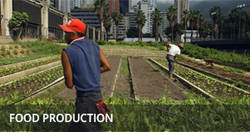
Food production depends and impacts on ecosystem services and biodiversity, with spillover effects going beyond food. Urban and peri-urban agriculture and food processing can contribute to improving the resilience of territories in the face of climate change, natural disasters and disrupted suppy chains. Urban food consumption can also influence where and how food is produced.
How can you optimize agriculture production while managing ecosystem services and biodiversity and improving resilience to climate change? Numerous examples are presented, explaining how to implement sustainable urban and peri-urban food production and processing; how these can mitigate the heat island effect, prevent floods, reduce the energy needed for cooling and heating buildings, improve social inclusion, (indirectly) raise awareness on combating food waste, or contribute to better access to healthy, diversified and fresh products. Resources on Urban and Peri-Urban Forestry are also available.
